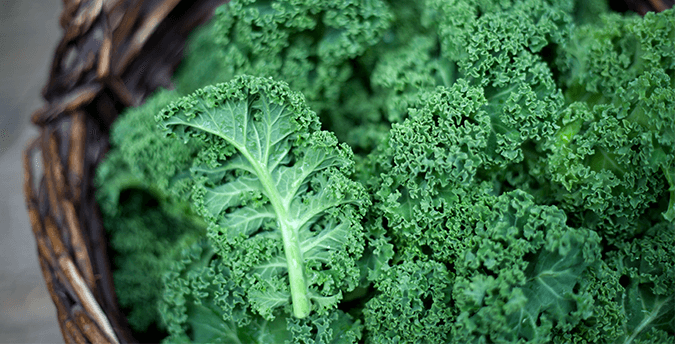Can Dogs Eat Kale?

Can dogs eat kale?
Well… it’s complicated.
On the one hand, dogs can potentially enjoy some benefits from kale. Kale is the vegetable that has quickly become a social media darling. Photos of kale-filled plates are all over Instagram. On its own, it isn’t particularly tasty, but it is very healthy and its unappealing nature has seemingly made it somewhat cool to enjoy. It’s dark and ugly, but it looks great on a plate next to an avocado or some coconut oil.
So, if this is the trendy superfood for humans to eat… is it also good for dogs?
CAN DOGS EAT KALE – THE LONG AND SHORT ANSWER
The short answer is that yes, dogs can eat kale in small quantities. There are lots of articles on the web advising kale as a safe and healthy snack for dogs, and there aren’t a whole lot of reports of dogs having serious problems as a result of eating it. Therefore, if you should drop some kale off of your plate onto the floor and your dog should gobble it up, there is no reason to worry.
But should you actively be feeding your dog kale? That’s a whole different question – and a very different answer.
While kale has many health benefits, it’s not that healthy for dogs.
For one, kale is a very rich source of fiber. Fiber passes through the human body and out the other end undigested. This is what makes it such a useful tool for improving human digestion and bowel problems. However, while this is good news for humans, it’s not so good for dogs.
That’s because dogs have different digestive systems than humans do. Dogs don’t typically eat a lot of fruit or vegetables in the wild, and if you pack their diet with them, then it will become overloaded. This can cause stomach problems and stomach upsets. In the worst-case scenario, it may upset their digestion and cause them to have difficulty absorbing other nutrients.
What’s more is that a lot of the articles that advise kale for dogs don’t cite any sources and clearly haven’t fact-checked with vets. We know this because kale actually contains some substances that are outright harmful for dogs.
One is calcium oxalate. This can cause health issues including kidney and bladder stones. The quantity isn’t big enough to cause serious harm to humans, but in dogs it’s more of an issue.
Kale may also cause issues with thyroid function. This can cause or exacerbate hypothyroidism—a condition that causes the metabolism to slow down. This is likely to result in weight gain and low energy. What’s more is that it can also cause a host of other issues such as acne and joint problems, and it may even hurt fertility in female dogs.
Another issue is isothiocyanates. These can cause gastric irritation, though the severity of the problem is relatively minor. In fact, all of these issues are easily resolved through a quick trip to a veterinarian, so you don’t need to be alarmed if your dog should accidentally consume some kale. But when you combine all these factors, it doesn’t really make much sense to give your dog kale especially.
Not only that, but kale isn’t particularly tasty for humans… and nor is it for dogs!
In short, your dog is unlikely to thank you for giving it kale, so you’re likely better off just avoiding it altogether.
ALTERNATIVES AND HEALTH BENEFITS
It’s a shame that dogs shouldn’t eat kale, as it has a host of potential health benefits otherwise. Kale is very low in calories and surprisingly high in protein. It also contains vitamin A, C, and K, as well as folate and even alpha-linolenic acid—an omega 3 fatty acid that can help to combat inflammation and also improve brain function.
All these are great benefits, but your dog doesn’t have to miss out! There are plenty of healthy dog foods that contain these health benefits. Seek out the right alternatives and you can find other ways to give your dog those things. Broccoli, for instance is also high in many of the same vitamins and minerals. Salmon is a great source of omega 3 fatty acid. And the right natural dog food product will combine these ingredients and others to provide a safe and healthy nutritious meal for your pup!
